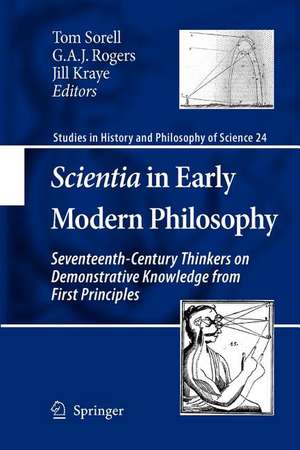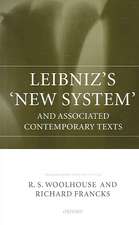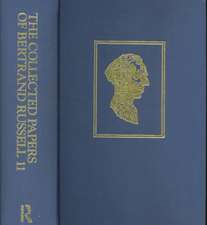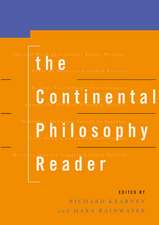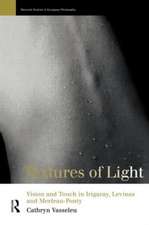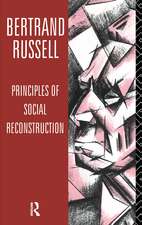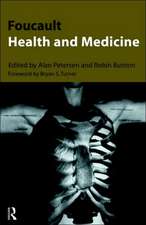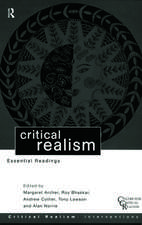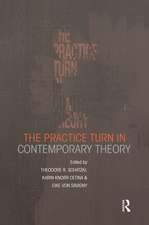Scientia in Early Modern Philosophy: Seventeenth-Century Thinkers on Demonstrative Knowledge from First Principles: Studies in History and Philosophy of Science, cartea 24
Editat de Tom Sorell, G.A. Rogers, Jill Krayeen Limba Engleză Paperback – 14 mar 2012
| Toate formatele și edițiile | Preț | Express |
|---|---|---|
| Paperback (1) | 633.53 lei 43-57 zile | |
| SPRINGER NETHERLANDS – 14 mar 2012 | 633.53 lei 43-57 zile | |
| Hardback (1) | 638.76 lei 43-57 zile | |
| SPRINGER NETHERLANDS – 23 noi 2009 | 638.76 lei 43-57 zile |
Din seria Studies in History and Philosophy of Science
- 15%
 Preț: 650.19 lei
Preț: 650.19 lei - 15%
 Preț: 700.75 lei
Preț: 700.75 lei -
 Preț: 284.47 lei
Preț: 284.47 lei - 15%
 Preț: 702.24 lei
Preț: 702.24 lei -
 Preț: 389.88 lei
Preț: 389.88 lei - 18%
 Preț: 1222.94 lei
Preț: 1222.94 lei - 15%
 Preț: 647.08 lei
Preț: 647.08 lei - 15%
 Preț: 645.47 lei
Preț: 645.47 lei - 18%
 Preț: 956.33 lei
Preț: 956.33 lei - 18%
 Preț: 953.97 lei
Preț: 953.97 lei - 15%
 Preț: 646.11 lei
Preț: 646.11 lei - 15%
 Preț: 641.85 lei
Preț: 641.85 lei - 15%
 Preț: 644.49 lei
Preț: 644.49 lei - 18%
 Preț: 951.29 lei
Preț: 951.29 lei - 15%
 Preț: 647.40 lei
Preț: 647.40 lei - 18%
 Preț: 953.20 lei
Preț: 953.20 lei - 18%
 Preț: 946.87 lei
Preț: 946.87 lei - 18%
 Preț: 1384.56 lei
Preț: 1384.56 lei - 18%
 Preț: 1234.14 lei
Preț: 1234.14 lei - 15%
 Preț: 637.78 lei
Preț: 637.78 lei - 18%
 Preț: 1219.77 lei
Preț: 1219.77 lei - 24%
 Preț: 586.94 lei
Preț: 586.94 lei - 18%
 Preț: 967.56 lei
Preț: 967.56 lei - 15%
 Preț: 641.38 lei
Preț: 641.38 lei - 15%
 Preț: 642.68 lei
Preț: 642.68 lei - 15%
 Preț: 642.03 lei
Preț: 642.03 lei - 15%
 Preț: 641.85 lei
Preț: 641.85 lei
Preț: 633.53 lei
Preț vechi: 745.32 lei
-15% Nou
Puncte Express: 950
Preț estimativ în valută:
121.23€ • 126.89$ • 100.90£
121.23€ • 126.89$ • 100.90£
Carte tipărită la comandă
Livrare economică 31 martie-14 aprilie
Preluare comenzi: 021 569.72.76
Specificații
ISBN-13: 9789400730809
ISBN-10: 9400730802
Pagini: 156
Ilustrații: XV, 139 p.
Dimensiuni: 155 x 235 x 8 mm
Greutate: 0.23 kg
Ediția:2010
Editura: SPRINGER NETHERLANDS
Colecția Springer
Seria Studies in History and Philosophy of Science
Locul publicării:Dordrecht, Netherlands
ISBN-10: 9400730802
Pagini: 156
Ilustrații: XV, 139 p.
Dimensiuni: 155 x 235 x 8 mm
Greutate: 0.23 kg
Ediția:2010
Editura: SPRINGER NETHERLANDS
Colecția Springer
Seria Studies in History and Philosophy of Science
Locul publicării:Dordrecht, Netherlands
Public țintă
ResearchCuprins
Philosophia, Historia, Mathematica: Shifting Sands in the Disciplinary Geography of the Seventeenth Century.- The Unity of Natural Philosophy and the End of Scientia.- Matter, Mortality, and the Changing Ideal of Science.- Scientia and Inductio Scientifica in the Logica Hamburgensis of Joachim Jungius.- Scientia and the Sciences in Descartes.- Scientia and Self-knowledge in Descartes.- Spinoza’s Theory of Scientia Intuitiva.- Scientia in Hobbes.- John Locke and the Limits of Scientia.
Recenzii
From the reviews:
“This narrowly focused collection of papers seeks to explicate competing notions of scientia in the works of 17th century natural philosophers … . The quality of the entries is consistently high and their variety is refreshing. … The papers can be read profitably by anyone interested in the history and philosophy of science in the early modern period … . this collection will prove extremely useful for a variety of purposes, including the amusement of pedants and the stoking of scholarly debate.” (Scott Stapleford, Philosophy in Review, Vol. 30 (6), December, 2010)
“Here for the first time, a series of clear, informative studies of the foremost early modern thinkers’ conceptions of scientia are brought together under one cover. The nine contributors are a veritable Who’s Who of historians of early modern philosophy and the philosophers covered include some of the leading thinkers of the age … . the volume offers both breadth and depth of coverage. … this collection is a welcome and timely addition to the field.” (Peter R. Anstey, Metascience, Vol. 20, 2011)
“This narrowly focused collection of papers seeks to explicate competing notions of scientia in the works of 17th century natural philosophers … . The quality of the entries is consistently high and their variety is refreshing. … The papers can be read profitably by anyone interested in the history and philosophy of science in the early modern period … . this collection will prove extremely useful for a variety of purposes, including the amusement of pedants and the stoking of scholarly debate.” (Scott Stapleford, Philosophy in Review, Vol. 30 (6), December, 2010)
“Here for the first time, a series of clear, informative studies of the foremost early modern thinkers’ conceptions of scientia are brought together under one cover. The nine contributors are a veritable Who’s Who of historians of early modern philosophy and the philosophers covered include some of the leading thinkers of the age … . the volume offers both breadth and depth of coverage. … this collection is a welcome and timely addition to the field.” (Peter R. Anstey, Metascience, Vol. 20, 2011)
Textul de pe ultima copertă
Scientia is the term that early modern philosophers applied to a certain kind of demonstrative knowledge, the kind whose starting points were appropriate first principles. In pre-modern philosophy, too, scientia was the name for demonstrative knowledge from first principles. But pre-modern and early modern conceptions differ systematically from one another. This book offers a variety of glimpses of this difference by exploring the works of individual philosophers as well as philosophical movements and groupings of the period. Some of the figures are transitional, falling neatly on neither side of the allegiances usually marked by the scholastic/modern distinction. Among the philosophers whose views on scientia are surveyed are Hobbes, Descartes, Spinoza, Gassendi, Locke, and Jungius. The contributors are among the best-known and most influential historians of early modern philosophy.
Caracteristici
Accessible study of the early modern philosophers dispute on Scientia Philosophers surveyed : Spinoza, Hobbes, Descartes, Gassendi, Locke and Jungius Through top contributors a must-read for everybody interested in early modern knowledge theory
